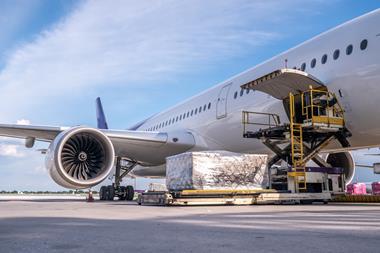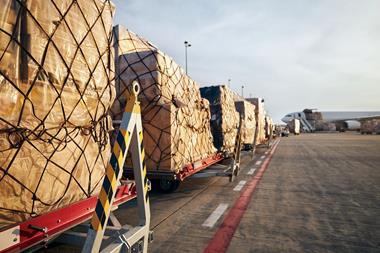
Dan March could fly an aircraft before he could drive and it was a love of flying that brought him into the world of airfreight – though with quite a few go-arounds before he ended up as chief executive of WCAworld, by most counts the world’s largest forwarder network.
He learned to fly through an RAF scholarship but also decided to go to university as a backup in case the flying career didn’t work out.
This proved to be very prescient: “When I left university, there were big defence cuts, so the RAF career just wasn’t available,” he recalls.
No matter, he opted for a career in publishing, in the first instance in the military sector.
“So I then spent several years flying around in fast jets – probably more so than if I’d opted for a career in the RAF. It was huge fun for a young man.”
Sadly, a busy work life eventually prevented him from keeping up his own flying but his brother still flies (as did his dad until age 83) and he part-owns a 1965 Cessna - so lifts are often available.
Then came a move within the publishing sphere, to Air Cargo News, of all places, where March spent a very happy (naturally) five years from 2005 to 2010 as editor and managing editor.
But the industry itself came a-calling: “We had a very good relationship with WCAworld and David Yokeum, who set up WCAworld in 1998, said that if I was ever thinking of moving, there was a job here for me.”
Like many of us journalists, March obviously had given some thought as to what it would be like to work in the ‘real world’ as opposed to writing about it, so he joined WCAworld as head of PR and marketing.
Did that come as a shock? “Perhaps in some ways, though my first task was to set up WCAworld’s in-house publication, the Voice of the Independent, which still exists today.
“We then carried out a rebranding exercise, to make the group of WCAworld networks more coherent and we stepped up our PR and marketing efforts. Obviously, our relationship with the trade press was very helpful here.
“Our name was becoming well known in the industry, but forwarder networks were still a fairly new thing then and we needed to reach out and explain what they could do.”
Eventually, in 2016, and with WCAworld expanding rapidly, David Yokeum offered March the position of chief executive.
“I think great credit must go to him for the original concept, but also for building up a great management team. Also, back in 2010, we had just 3,800 forwarding offices; today, it’s 12,600,” he says.
Global presence
Individual offices are the WCAworld basic unit of membership and it is on this that its fees are based. It can boast an impressive 8,100 actual companies as members.
The network is represented in virtually every country in the world; the very few exceptions tend to be countries under international sanctions like North Korea or Iran.
Asia was a big spur to growth: “David actually moved to Asia because China was going through very rapid expansion and he spent a lot of time with the government and forwarding organisations. For my part, I’ve been spending more time in India, a country that I can see growing very strongly, though that depends on geopolitics of course.”
Speaking of which, one heartening sight that March has witnessed at WCAworld conferences is the way that people from nations that are supposedly at loggerheads with each other will sit down together and talk to each other.
“Business is business, and the real world doesn’t necessarily reflect politics,” he says.

Source: Shutterstock
Along with Asia, one of the biggest areas of growth for the network has been Latin America despite – or possibly because of – the challenges being faced in that part of the world.
WCAworld differs from some other forwarder networks in that it doesn’t have an exclusive ‘one member one country/region’ structure.
That would be too limiting, March explains: “If we restricted it like that, we might find that a member doesn’t have capacities or skills in areas that another member needs, such as air, ocean, cold storage or bonded warehousing for example.”
WCAworld is a multimodal network though airfreight is important to many of its members.
It does though have strict qualifying criteria. Generally, members need to have been trading for five years and must provide full financial information and proof of liquidity; WCAworld will often carry out a site visit and will also use World-Check to ensure that there are no individuals subject to sanctions.
“We do want quality forwarders and in fact there are many that apply but who we reject for various reasons,” March says.
There is a lot more to running a successful forwarder network than amassing a large number of members and leaving them to get on with it. Added-value services are vital.
Members work together on a profit-split basis and the network operates a financial guarantee scheme to ensure that they get paid in the event that one member fails to pay another for any reason, possibly bankruptcy or a dispute.
“We also have a dispute resolution panel. Our members are handling millions of shipments a year and inevitably a small percentage don’t go right. But this avoids members from having to go down a legal route and saves them huge amounts in legal fees.”
He continues: “We also have Partner Pay, which we set up several years ago when banks were charging perhaps $35 for every wire transfer, which is a lot if you are only making a $200 profit on a shipment.
“It operates in every country in our network except India – banking regulations there don’t allow it – and it allows every member to pay every other member free.”
Saving these small but frequent costs is important to WCAworld members, which are all small to medium-sized companies; the major multinationals are barred, mainly on the grounds that they already have their own extensive networks and would in most cases have little to offer the rest of the membership.
Drilling down
Within WCAworld’s 12,600-strong membership, there are many sub-networks - it makes for a more agile structure. However, members of one WCAworld network are not barred from dealing with members of its other networks, although there are some financial advantages in staying within their specific sub-network.
“We have now built up eight general networks, but we also have a whole group of speciality networks, for example out of gauge cargo, pharma – which has grown enormously - dangerous goods, time-critical, relocation and so on. One that we’ve just launched is live events for concerts or art exhibitions.”
Two other networks are for e-commerce and courier. These two networks are being brought together as there is much overlap between them.
They also tend to involve companies other than forwarders such as warehousers, fulfilment operators, customs and IT specialists.

Source: Gorodenkoff/shutterstock.com
Some of these networks have in turn spawned other specialisms – the pharma network offers extensive training through its academy to help members achieve training to the GDP standard that it insists on for those members.
The academy also offers training in insurance, basic and higher-level forwarding and more.
“The academy is run out of our Manchester (UK) office and they’ve done a really fantastic job,” March explains.
Even among the eight ‘general’ networks there are many facets. There is WCA First, which as the name suggests includes some of the earliest joiners or China Global for forwarders either in China or a strong interest in that market.
Other, more ‘boutique’ networks include the Global Affinity Alliance, where WCAworld relaxes its minimum five years trading rule “in order to attract younger, hungrier companies”.
Lognet Global also breaks the mould in that operates on a semi-exclusive basis with a maximum number of companies per location.
WCAworld has made some acquisitions, such as Elite Global purchased six years ago and Singapore-based IFC8.
“We’re not actively looking for other networks to buy, though if someone came along we would have a look. But most of our growth has been organic.”
The fact that WCAworld can continue growing in this way, despite the emergence of many rival networks, is a tribute to the resilience of the freight forwarding industry.
Going back to March’s Air Cargo News days, he remembers an article in which DHL confidently predicted the death of the independent forwarder.
Almost two decades on, that certainly hasn’t happened: “In fact, the independents still have at least the same market share as they did back then.”
While mergers and takeovers within forwarding have occurred, “if anything they have produced more members for us, because we often find that staff leave and go into business for themselves”.
In a service industry, there will always be a place for the smaller forwarder because, as March says, “They are the guys who will help you out if you have a problem at 8pm on a Friday night.”













